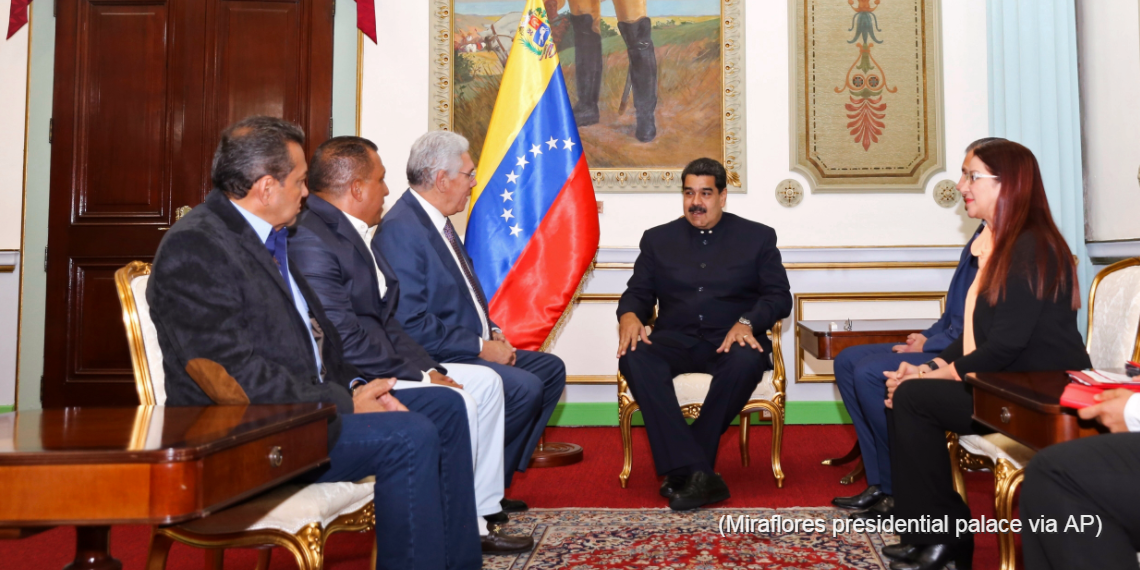In the wake of the decision by four opposition governors of the Accion Democratica party to be sworn in before Venezuela’s National Constituent Assembly (ANC), the Democratic Unity (MUD) coalition is in the midst of the worst crisis it has seen since its creation. While there is talk of restructuring the opposition bloc, a major test of the MUD’s cohesiveness is already fast approaching in the form of municipal elections, and the opposition is showing no signs of renewed unity on the matter.
On October 23, four of the five MUD governors-elect broke ranks from the rest of the opposition and agreed to be sworn in before the ANC, in addition to meeting privately with President Nicolas Maduro (see picture above). The government was quick to disseminate photos of the four—Antonio Barreto of Anzoátegui, Ramón Guevara of Mérida, Alfredo Díaz of Nueva Esparta and Laidy Gomez of Táchira –at the ceremony, emphasizing that they had “subordinated” themselves to the ANC. The fifth opposition figure to win a governor’s race on October 15 in Zulia state, Juan Pablo Guanipa of Primero Justicia, has subsequently been ousted by the Chavista-controlled state legislature of Zulia after refusing to recognize the ANC.
All four governors sworn in are members of the Accion Democratica party, led by Henry Ramos Allup. While Ramos Allup has said that he asked the four AD governors not to accept the government’s demand that they be sworn in before the all-powerful body, and has said that these four have “self-excluded” themselves from his political party, speculation is rampant that he secretly green-lighted the move.
Notably, while these four AD governors may have harbored hopes that being sworn in would afford them a certain stability in their new positions, these hopes faded slightly in the immediate aftermath of the ceremony. President Maduro announced that four states won by opposition candidates (Zulia, Mérida, Nueva Esparta and Anzoátegui) would have “protectors” tasked with a vague mandate of “orienting, accompanying and attending to the needs of the people.” In all four cases, this newly created position is held by losing Chavista candidates to the governor’s office.
A New MUD?
In the wake of the blowback from the swearing in ceremony, and in the aftermath of the October 15 elections more broadly, actors within the MUD are talking openly about the need to restructure the coalition.
Every major party in the MUD has criticized the governors for their decision, but former presidential candidate and Primero Justicia leader Henrique Capriles has been particularly vocal in singling out Ramos Allup. On October 24 Capriles announced that he could no longer continue to be a member of the MUD as long as Ramos Allup remained a part of the coalition. While he claimed to be speaking for himself and not for his party, Capriles also called for a change to the MUD, and for its “refoundation.”
The proposal for some kind of reevaluation of the MUD has been echoed by Un Nuevo Tiempo’s Manuel Rosales, as well as Voluntad Popular coordinator Freddy Guevara. The latter has called for a new opposition grouping that “goes beyond political parties” and is built on five points. These are: 1.) rejecting the ANC; 2.) not participating in elections until the rectors of the National Electoral Council (CNE) are replaced; 3.) adhering to the opposition’s symbolic July 16 referendum in which 7 million people reportedly rejected the ANC; 4.) adopting all forms of nonviolent struggle; and 5.) keeping up international pressure on the Maduro government to address the political and economic crisis.
Other sectors in the MUD have also expressed resentment with the bloc. Over the last year the MUD has largely made joint decisions in “group of four” meetings, comprised of representatives of the four parties with the lion’s share of opposition seats in the National Assembly: Primero Justicia, Acción Democrática, Un Nuevo Tiempo, and Voluntad Popular. As El Nacional reports, representatives of the five other minor parties in the MUD are resentful of this and complain of not being included in decision making.
Rough Seas Ahead
With the opposition more divided than ever, the government has wasted no time in capitalizing on the moment to announce plans for municipal elections in the coming weeks. On October 26, the ANC approved a decree mandating electoral officials to hold mayoral elections—as well as elections for the governor of Zulia, owing to Guanipa’s ouster—in December.
This marks the first test of the opposition since their highly public rupture following the October 15 vote. So far, Voluntad Popular has been the only MUD party to clearly state that it will not participate in the municipal elections. Smaller MUD parties like Henri Falcon’s Avanzada Progresista have said that they will present candidates, but so far the participation of other major MUD actors remains an open question.
This division does not bode well for the opposition’s longer-term electoral aspirations. With Leopoldo Lopez still under house arrest, Henrique Capriles barred from holding public office, and Ramos Allup under fire, the Venezuelan opposition is far from rallying behind a single figure to run in presidential elections slated for next year. Some have suggested that the time is ripe for an outsider to emerge as a viable opposition candidate, but so far none has materialized.



